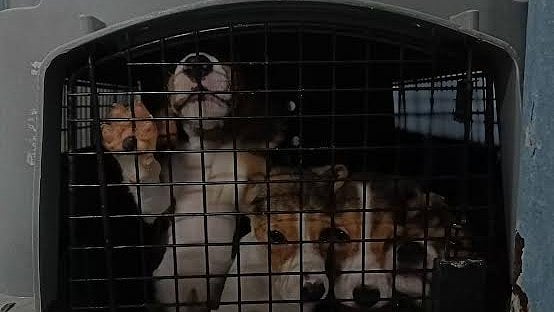
The overcrowding, coupled with a lack of socialization and competition for food, led to extreme frustration and frequent fights, often causing serious injuries, especially to the dogs' ears.
Credit: PETA India
Hyderabad: People for the Ethical Treatment of Animals (PETA) India on Tuesday presented a first-of-its-kind whistleblower expose uncovering apparent egregious abuse of dogs, rhesus macaques and minipigs at a Telangana-based government-registered preclinical contract research laboratory that tests drugs, pesticides, and medical devices on animals, often for foreign clients.
According to the whistleblowers who contacted PETA India, this laboratory which poisons beagles and other animals as a matter of course, has reportedly subjected animals to overcrowded cages or in other cases social isolation, environments that caused animals injuries and infections, and an often painful death when the animals are deemed no longer of use.
Among the reported abuses, with some photo and video evidences, whistleblowers say according to PETA India's Research Policy Advisor and scientist, Dr Anjana Aggarwal, the Telangana company kills dogs using thiopentone but fails to sedate them beforehand, a basic step that could reduce their fear and distress in their final moments.
The company also purchased Göttingen minipigs from a company in Denmark, but did not have a license to breed them. At one point, a minipig became pregnant, and the head veterinarian ordered the killing of the eight to ten piglets born. The piglets were painfully killed via intracardiac injection.
“PETA India’s expose of this major contract laboratory is the first of its kind in the country to rip open the veil of secrecy surrounding facilities where dogs, rhesus macaques, and other animals endure painful procedures, languish for years, and where scientific credibility goes to die. We urge government regulators to end the torment of animals imprisoned at Palamur Biosciences. Anything less than the facility’s permanent shutdown is a green light for abuse,” said Dr Anjana Aggarwal.
PETA said that the company kept more beagles than the facility could properly house and kept 1,500 dogs in a space designed for a maximum of about 800, forcing three to four dogs into cages meant for just two.
The overcrowding, coupled with a lack of socialization and competition for food, led to extreme frustration and frequent fights, often causing serious injuries, especially to the dogs' ears. Despite these wounds, the company failed to provide basic care, neglecting both proper wound cleaning and pain management.
Animal care staff at the company were seen handling dogs roughly, with some workers kicking the animals or carelessly closing cage doors on their legs. A whistleblower claimed dogs sustained fractures from rough handling.
In some studies conducted by the company, dogs were injected with test compounds under the skin (subcutaneously). These injections either due to the compounds themselves or impurities in their formulation sometimes caused infections at the injection sites. These infections could spread, eating through the skin and damaging the underlying tissue, leaving the dogs with open, painful wounds.
Regarding this, a whistleblower said, “Depending on the location of the abscess, there can be further health issues suffered by the dogs. For example, if the abscess is in the shoulder, that can inhibit the dog’s ability to move. They can be in severe pain; they will lose their appetite, lose weight.”
Meanwhile, the other whistleblower stated the animals would suffer “like hell”.
It was also said that the Telangana-based government-registered contract laboratory obtained wild rhesus macaques from a supplier in Rajasthan.
Some monkeys who had been captured tested positive for zoonotic pathogens, likely monkeypox.
Despite the potential public health risk to company employees and the community at large, the company kept the matter quiet and simply killed the monkeys while risking infection to others who were used for experiments.